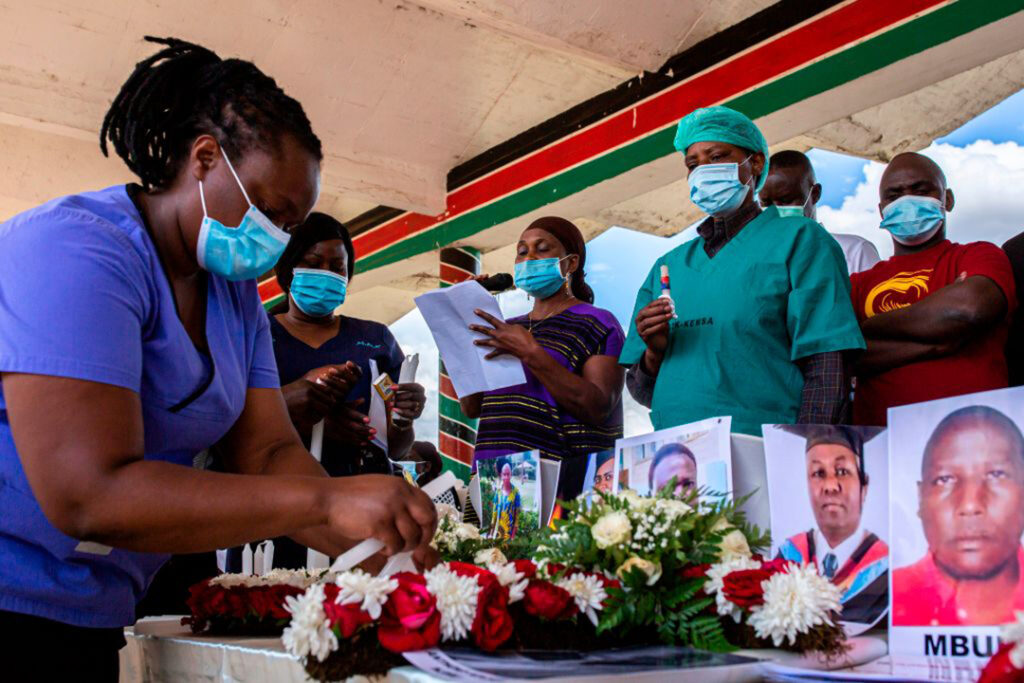ADF STAFF
Up to 70% of health care workers in Ghana and Kenya are experiencing burnout or stress as they lose patients — and colleagues — to COVID-19, a new study shows.
About 62% of health care workers in both countries said they were unprepared for the emotional and physical demands brought on by the pandemic, while roughly 1 in 3 reported being dissatisfied with their jobs, according to the study by research journal PLOS Global Public Health.
“Given the already precarious position of the healthcare workforce in Africa, if efforts are not put in place to improve job satisfaction among healthcare workers, the pandemic could be worsened by either healthcare workers leaving their jobs or performing poorly,” Patience Afulani, lead author of the study and assistant professor of epidemiology at the University of California, said in a report by SciDev.net, a nonprofit science and technology news site.
The PLOS Global study noted that job dissatisfaction among health care workers throughout Sub-Saharan Africa was high before COVID-19 hit.
The pandemic exacerbated the situation. Health care workers face higher risks of getting infected, and they fear becoming infected and sickening loved ones. The pandemic also brought about higher workloads, stress over lack of personal protective equipment (PPE) and mental health issues, according to the PLOS Global study.
Health systems in countries including Ghana and Kenya were strained before the pandemic. Ghana has less than one hospital bed per 1,000 people and Kenya about one bed per 1,000 people. Both countries have fewer than two doctors per 10,000 people, according to PLOS Global.
Kenya’s response to the pandemic was hampered by corruption. An investigation ordered by President Uhuru Kenyatta in August 2020 found that the country lost $70.4 million through misuse of funds, Human Rights Watch reported. That money could have provided health care workers with adequate protective equipment, enhanced testing capacity and other preventive measures.
“Kenyan authorities should take urgent steps to ensure health workers on the front lines of the fight against COVID-19 are able to work in an environment that would not put them at unnecessarily heightened risk,” Otsieno Namwaya, East Africa director at Human Rights Watch, said on the organization’s website in late October.
Kenyan medical workers interviewed by Human Rights Watch said they were overworked, stressed and did not feel supported by authorities because fewer than 1,000 nurses were recruited on one-year contracts and no new doctors were recruited.
“We were being paid 10,000 Kenyan shillings ($100) per month, which we did not get for six months,” one nurse told Human Rights Watch. “The authorities gave us no risk allowances, no insurance, no health cover, no PPEs, and then we were placed at the emergency area where we were the most exposed.”
Ghanaian nurse Evelyn Narki Dowuona, who works at Ga East Municipal Hospital in Accra, told the World Health Organization (WHO) in July 2020 that although her hospital followed all safety protocols, she still worried about the safety of herself and her colleagues.
“Every time you hear about another colleague in your country getting infected or dying from this pandemic, it really causes a great deal of concern and sadness,” Dowuona said in a story on the WHO’s website. “It is a big blow. You ask yourself that if the health workers are infected or dying, who will manage the pandemic. It is very sad.”
COVID-19 infection rates have steadily declined in Ghana and Kenya since August. According to the Africa Centres for Disease Control and Prevention, Kenya reported more than 254,400 COVID-19 cases and 5,325 deaths, while Ghana has reported more than 130,700 coronavirus cases and more than 1,200 deaths, as of November 18.

